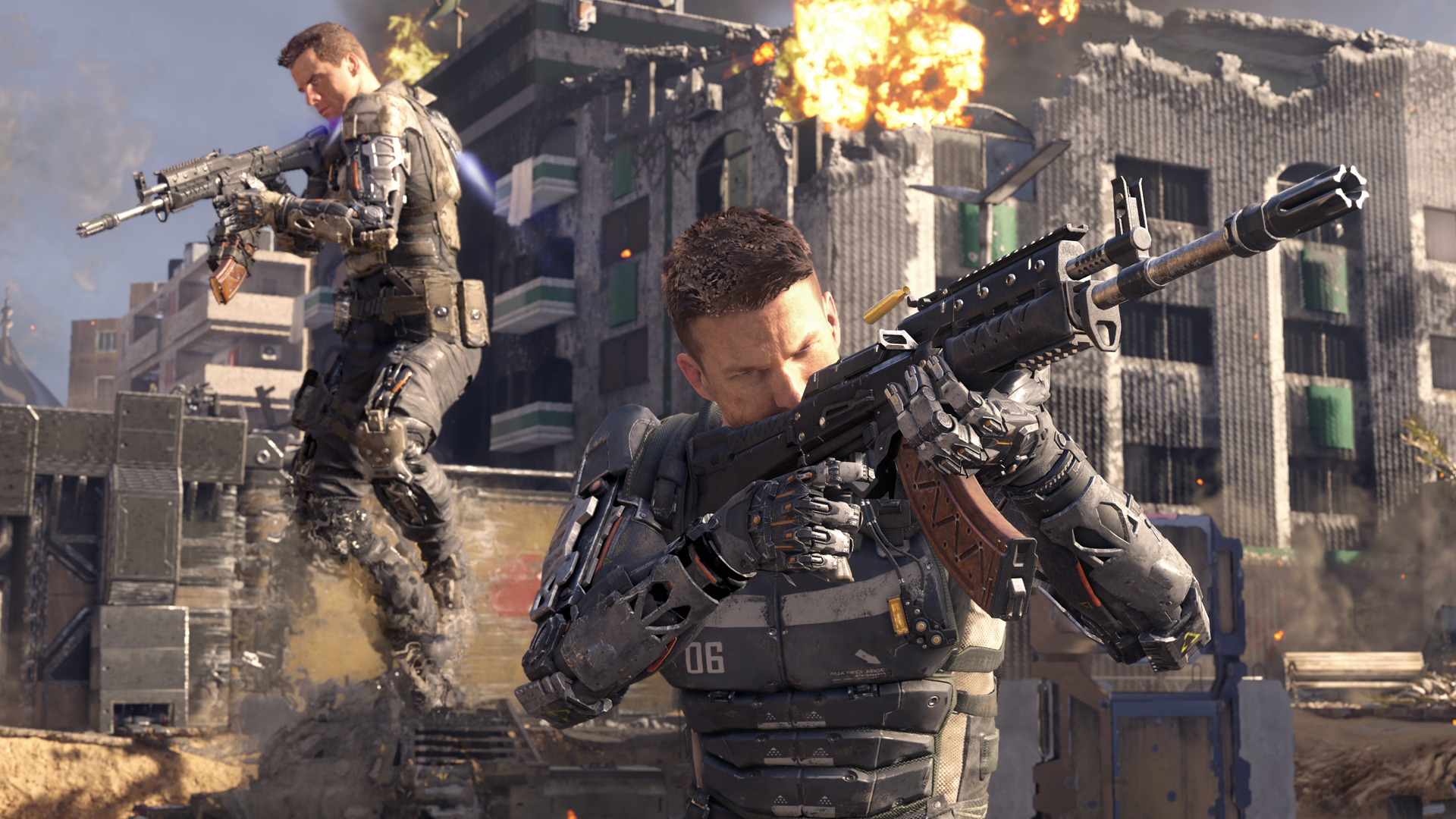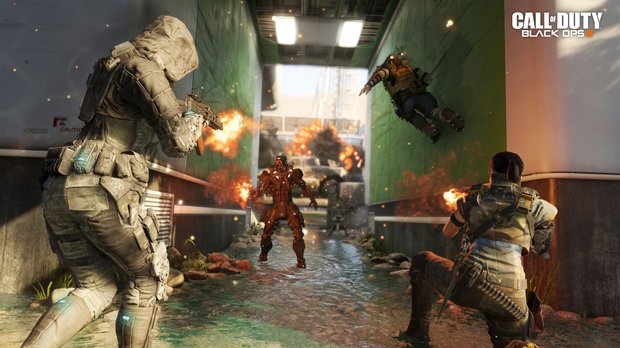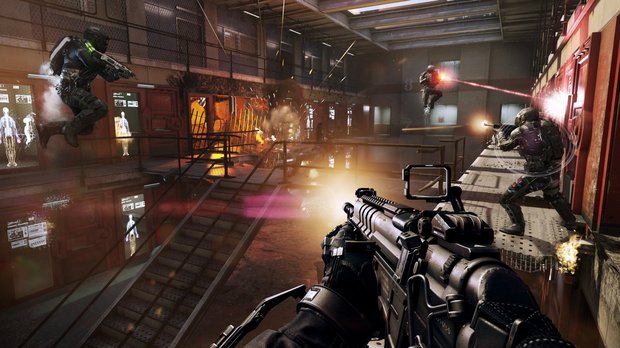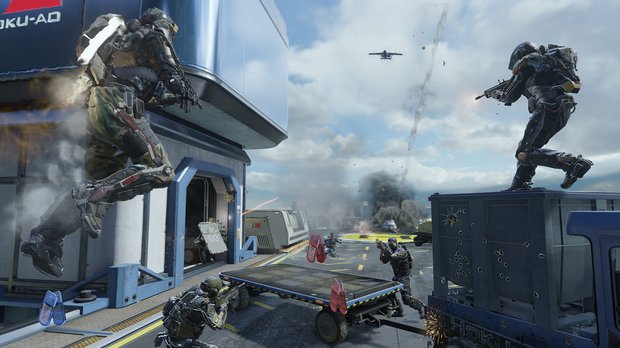Can Call of Duty's multiplayer ever turn back from using jetpacks?
Call of Duty has come a long way from its World War 2 roots. The series started off as a relatively simplistic shooter, but has evolved to make room for new, genre-defining mechanics. Over the last two Call of Duty games, the series has followed the path of Titanfall, allowing players to dash around the map, high jump, and wall-run with the use of jetpacks, cybernetic rocket boots, and exosuits. The new traversal mechanics have changed the way gamers play Call of Duty, and now that Black Ops 3 is joining Advanced Warfare with enhanced mobility mechanics, the entire series seems to be making this shift. Once you use a jetpack, can you go ever back?

With Call of Duty moving into future timelines in the Advanced Warfare and Black Ops 3 titles, the way soldiers move about the battlefield changes the traditional run-and-gun shooting substantially. When you're using a strength-enhancing exosuit or jetpack, there's no need for ladders - you can just jump up to the platforms above you. Walkways? Who needs them? Just wall-run across gaps. Exosuits and rocket boots make traversing the environment much faster and ultimately more entertaining.
These mobility mechanics aren’t cheating; they actually improve the game and give players access to greater gameplay diversity. Players have an easier time getting over obstacles, making combat more fluid and varied, and if you've ever gotten a kill while simultaneously wall-running you know how much of a thrill that can be. The enhanced mobility allows players to come up with advanced combat strategies, and developers to make more intricate multiplayer map layouts that encourage gamers to play in different ways.

And it isn't just the fact that jumping over pits and bounding around the environments is more fun - the new mechanics have also raised the skill ceiling for players. Before our soldiers were hooked up to robot suits and rocket boots, maneuverability was simple. Strafing, diving, and small jumps were your only evasive maneuvers. Now players can extend gunfights by dashing out of the line of fire, use double jumps or hover abilities to trick opponents into an ambush from above, or activate superslides to surprise enemies from below. The firefights would be a lot more predictable without the futuretech, but strap on a jetpack and the combat gets much more interesting.
All that said, the thing about bringing jetpacks and more advanced movement to Call of Duty's multiplayer is that it locks future titles into timelines where personal propulsion would actually make sense. As much as I would like to see the Call of Duty series return to a World War 2 scenario, I wouldn't be willing to sacrifice the mobility in the future setting's multiplayer. It's just too much fun, and taking away the power of temporary flight would feel like a step backward. Try going back to the old Modern Warfare multiplayer after playing Blops 3: you'll feel as though someone's clipped your wings, forcing you to trudge through the mud at a snail's pace.

So, what does Call of Duty do now? Every developer working on a CoD game has moved its games' timelines into 20XX and beyond. Sledgehammer's Advanced Warfare series features Exosuits, boost jumps, and super strength. Treyarch has fully embraced the future timeline, giving players jetpacks to mess around with in Black Ops 3, and it even cuts most story ties from the previous Vietnam and near-future-era Black Ops games. Then there's Infinity Ward's Ghosts series, which is set more than a decade from now, putting Ghosts on the path to creating an enhanced super soldier of its own that can run faster and jump higher than your average modern warfare Joe. It seems the future of Call of Duty is the future.
It isn't just Call of Duty that looks to be stuck in this trend, either. Just about every major competitive shooter in the past year has included some sort of verticality component and a futuristic setting. Halo 5 adds suit abilities that enhance the Spartans' mobility letting them traverse levels with much more aerial freedom. Destiny's multiplayer is all about avoiding opponent's sightlines with shotgun slides, Exotic helmets that let you hover while shooting, and far-reaching double jumps. It feels like you're always playing as a gun-toting superhero in today's shooters. Perhaps futuristic timelines and ultra mobile gameplay are just the next fad - the logical continuation of the WW2 obsession during the PS2 era, and the modern warfare trend of the Xbox 360 generation.
Sign up to the GamesRadar+ Newsletter
Weekly digests, tales from the communities you love, and more

After the future era and jetpack trend passes, Call of Duty is going to need to reinvent itself to remain fresh. For years, the series has been building on the Modern Warfare formula, adding new time periods, inflating multiplayer features, and enhancing player movement, all while keeping the same base shooting mechanics and basic modes as a foundation. But if the series is going to venture into a time period that doesn't allow for rocket boots and exosuit-powered wall-running, then maybe it needs to cut away all the fat entirely and just go back to the absolute basics: focusing on superb shooting mechanics and creating memorable online experiences.
Call of Duty and other shooters might be backing themselves into a corner with jet fuel-powered, super-soldier experiences, but that could end up being a good thing. It could prevent game creators from pushing out the same annual formula for future titles, and force developers to reinvent the way we use cover in an FPS, make ballistic damage to environments more realistic, and really usher the shooter into its next big phase. They could make shooting more immersive, create more intelligent AI opponents, or make use of up-and-coming tech like VR systems. It's going to be interesting to see how the next few years pan out. The wall running and jetpacks are a blast right now, but when I've finally had enough of it, I hope CoD will be able to evolve the series into something that really pushes the franchise forward.
Many years ago, Lorenzo Veloria was a Senior Editor here at GamesRadar+ helping to shape content strategy. Since then, Lorenzo has shifted his attention to Future Plc's broader video game portfolio, working as a Senior Brand Marketing Manager to oversee the development of advertising pitches and marketing strategies for the department. He might not have all that much time to write about games anymore, but he's still focused on making sure the latest and greatest end up in front of your eyes one way or another.



